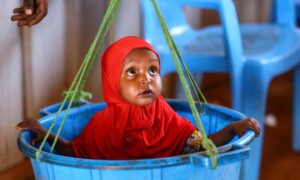
One young child in four globally has a diet so restricted it is likely to harm their growth, brain development and chances of survival, according to a new report.
Many of the children live in areas that have been designated by the UN as “hunger hotspots” – including Palestine, Haiti and Mali – where access to food is expected to deteriorate over the coming months.
The first report from the UN’s children’s agency, Unicef, to assess the diets of under-fives, found about 181 million from almost 100 countries were consuming, at most, only two food groups on a daily basis – typically milk with a starchy food such as rice, maize or wheat.
This meets the criteria for “severe food poverty” and means they are “children living on the brink”, said Catherine Russell, Unicef’s executive director.
“This can have an irreversible negative impact on their survival, growth and brain development,” she said. “Children who consume just two food groups per day, for example rice and some milk, are up to 50% more likely to experience severe forms of malnutrition.”
Countries with higher levels of severe food poverty also tended to have higher levels of stunting, where children are significantly shorter than expected for their age.
The after-effects of the Covid-19 pandemic, conflicts and the climate crisis are among the causes of high food prices, the report, published on Thursday, found. However, household income was not the only driver of diet quality, with children from wealthier households in some countries also in severe food poverty due to a predominance of unhealthy and non-nutritious foods, and a lack of knowledge among parents about what a healthy diet should look like.
While less than 10% of children in severe food poverty are fed fruit and vegetables, and less than 5% meat, poultry and fish, fast foods and sugary drinks were marketed aggressively and becoming “entrenched” in many of their diets, the report said.
